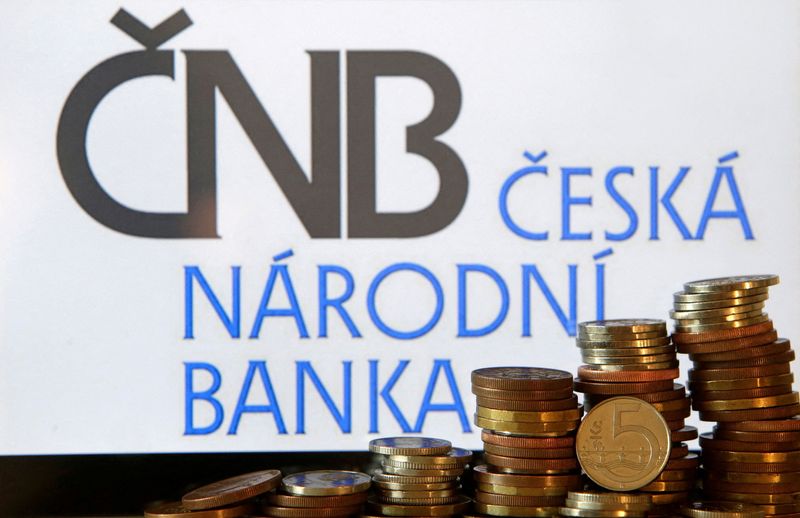By Jason Hovet
PRAGUE (Reuters) - Central European policymakers are seeking to end a cycle of interest rate hikes running since last year even as inflationary pressures remain and the world's major central banks keep pursuing higher rates.
While the region was well ahead of others last year in policy tightening, it now wants to be the first to call time on hikes. Whether it can do so will depend much on wage pressures subsiding and how much a weakening market mood will hurt its currencies.
Central banks in Hungary, the Czech Republic and Poland begin a round of policy meetings on Tuesday with rate setters in Budapest weighing what might be one final rate increase.
The Czech National Bank, meeting on Thursday, already left rates unchanged in August for the first time in over a year, while the National Bank of Poland's governor signalled this month a final cosmetic hike, or even no change, could come at their Oct. 5 meeting.
The moves to end tightening cycles are not without risks. Markets are turning against riskier emerging market assets as the U.S. Federal Reserve aggressively hikes rates - boosting the dollar - while wage growth in central Europe is running hot in most places.
That could add pressures to inflation that is still to peak and prolong the region's fight with the biggest price surge in decades well into next year.
Analysts say this could lead to rates being kept elevated for longer or, possibly, further policy tightening could be needed.
"In Hungary, I think there is still road ahead (for rate hikes)," Juraj Kotian, an economist with Erste Group Bank, said.
The National Bank of Hungary last month brought the main rate to 11.75%, up more than 1,100 basis points since June 2021.

Deputy Governor Barnabas Virag said last week the bank could raise interest rates by 50, 75 or 100 basis points on Tuesday, after which "all options are on the table," including ending rate rises at once or phasing out the cycle with several smaller steps. Analysts, though, see further rate hikes even after Tuesday. In August, inflation hit a rate of 15.6%. Wages, though, are keeping pace, rising 15.3% year-on-year in July - the seventh straight double-digit increase in a row. Similarly, the forint has lost over 9% this year and hit an all-time low of 416.90 per euro in July as Budapest is locked in a dispute with the EU's executive over rule of law issues that is blocking the disbursement of needed funds. It traded around 408 on Monday. "Tightening (beyond Tuesday) is justified. The only question is the level," Kotian said, adding smaller hikes are possible. WAGE PRESSURES Poland, too, has had double-digit wage growth since February, and inflation is running at over 16%. Poland's government is also spending big to freeze power prices for people hit by soaring bills. While central bank Governor Adam Glapinski has guided for rates to possibly peak at 7.00% in October, Goldman Sachs (NYSE:GS) said wage growth, fiscal easing and currency pressures will make it hard for the bank to deliver on this and rates could still rise. "In addition to inflation developments, we think that a key factor that will determine whether the (central bank) will be able hold its current stance is the extent of depreciation pressures on the zloty," it said. The Czech central bank is also facing currency pressures, but has used billions of euros of its massive international reserves to intervene in markets to prevent excessive weakening. In August, the inflation rate slowed to 17.2% - the first sign of a price peak in central Europe. Czech wage pressures are also more subdued than in Poland or Hungary, giving the country's central bank the best shot at holding the line on rates.
But policymakers are still watching for signs of pay picking up in a tight labour market. Czech government support to ease the impact of the energy crisis is also growing. "Particularly in Poland and the Czech Republic, central banks are ending their tightening cycles just as governments are announcing more fiscal support," said Liam Peach, an economist with Capital Economics, adding this risked keeping core price pressures strong. "That means that central banks either have to keep interest rates high well into next year, maybe 2024, or if those price pressures remain acute in the next few months, they may have to hike interest rates again."